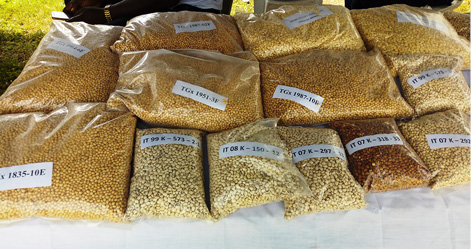Fake seeds in circulation decreased by 81% — NASC DG
The National Agricultural Seed Council (NASC) says the amount of fake seeds in circulation between 2012 to 2016 has decreased by 81 per cent. Dr Philip Ojo, the Director General, NASC, disclosed this in Abuja on Monday, at the Second Edition of the SeedConnect 2019. He said the success was achieved through continued collaboration of […]

The National Agricultural Seed Council (NASC) says the amount of fake seeds in circulation between 2012 to 2016 has decreased by 81 per cent.
Dr Philip Ojo, the Director General, NASC, disclosed this in Abuja on Monday, at the Second Edition of the SeedConnect 2019.
He said the success was achieved through continued collaboration of relevant agencies which ensured that farmers got improved seeds on time to boost their productivity.
“With the position Nigeria occupies in the region, there has to be concerted efforts to ensure quality seeds are sold in the country.
“So much efforts have been taken by sensitisation and surveillance of the seed market, liaising with state government through collaboration with private partners.
“Continuous efforts have been made by NASC to curb these activities through market sensitisation and market raids for fake seeds before and during planting season.
“We are optimistic that the percentage of fake seeds in circulation will keep declining with more sensitisation and awareness campaign, ” he said.
Ojo, however, said that in spite of the large quantity of seed produced currently, the country was still experiencing wide gap between supply and quantity required.
“In 2018, the total certified seed produced for 7 major crops, Maize, Rice, Sorghum, Cowpea, groundnut, Millet and Soybean was 72,951 metric tonnes
“But the actual requirement was 422,229 metric tonnes leaving a deficit of 349,227 metric tonnes, worth over N130 billion.
“By year 2020, the requirement of certified seed will be 441,800 metric tonnes which is approximately N143 billion.
“This is a huge business opportunity waiting to be tapped. This is also a huge space for private companies to key into, ” he said.
The Director-General explained that the conference was an opportunity for stakeholders across West Africa to connect with other countries to learn about seed business.
“It is something that is beyond Nigeria, that is why it is called seed connect Africa and this the second edition.
“The focus is to build upon what we did last year, looking at the gap that is in the industry, the potential and opportunities that are there for the seed companies to tap,” he said.
Also, Mr Richard Olafare, President, Seed Entrepreneurs Association of Nigeria (SEEDAN) said that his association was the largest in Africa, contributing to the feeding of over 300 million mouths in Nigeria and West Africa.
He said the association started modestly with a capacity to produce only about 5,000 metric tonnes of quality seeds about 12 years ago.
He added that it now had the capacity to produce over a 100,000 metric tonnes of quality seeds.
Mr Munir Babagana, representative of Chairman, Senate Committee on Agriculture, Sen. Abdullahi Adamu, said that the Seed Bill had been passed by the National Assembly.
He added that the bill was now with President Muhammadu Buhari for assent, and hoped that it would be signed into law before the end of the 8th Assembly.
On her part, Ms Yolanda Huerta, Director of Training, International Union for the Protection of New Varieties of Plants, Switzerland, said agriculture was facing a wide array of challenges.
She, however, called on the Nigerian government to provide an opportunity for youths to go into agriculture in order to enhance the country’s development.
NAN reports that the conference, which has the theme: “Enhancing the Potentials of the Nigerian Seed Industry, brought seed stakeholders together from within and out of the country.(NAN)
